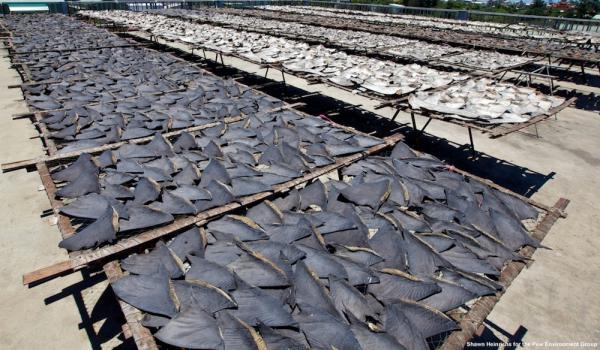
Shawn Heinrichs for the Pew Environment Group
Sharks are so coveted throughout Asia for their fins that a good 30 percent of the world’s species are in danger of extinction.
Read more at http://indiancountrytodaymedianetwork.com/2013/03/14/international-wildlife-trade-group-votes-protect-hundreds-species-148190
Source: Indian Country Today Media Network
In its final plenary vote, the Convention on International Trade in Endangered Species of Wild Fauna and Flora (CITES) formalized the protection of hundreds of species, including manta rays and five species of shark, at its closing session in Bangkok on March 14.
It brings to eight the number of shark species that fall under CITES protection, The New York Times reported. Trade in two species of manta ray is also protected.
“This is a major win for some of the world’s most threatened shark species, with action now required to control the international trade in their fins,” said Susan Lieberman, director of international environment policy at The Pew Charitable Trusts in a statement. “This victory indicates that the global community will collaborate to address the plight of some of the most highly vulnerable sharks and manta ray species. Today was the most significant day for the ocean in the 40-year history of CITES.”
The Pew Charitable Trusts has dubbed 2013 the Year of the Shark to bring attention to the danger that these marine animals are in worldwide. Shark fins, meat, gill plates and aquarium animals are in high demand, according to the International Union for Conservation of Nature (IUCN), which has 143 shark species on its endangered list.
“The rising demand for shark fins, shark meat, gill plates, and aquarium animals is seriously threatening the survival of these species,” the IUCN said in a statement after the vote. “Up to 1.2 million oceanic whitetip sharks, which are fished for their large and distinctive fins, pass through the markets of Southeast Asia every year, and over 4,000 manta rays are harpooned for their gills.”
The manta rays are harvested for their gill rakers, which filter their food from the water and are used in an Asian health tonic, Pew said.
In all, hundreds of species were awarded protection, CITES said in a statement, among them rhinos and elephants, which have been hunted nearly to extinction by poachers. A U.S.–sponsored ban on trading polar bear parts was defeated, in a move that was lauded by Inuit peoples.
Two thirds of CITES’ 177 member governments and organizations voted in favor of the shark and ray protections. The international body meets every three years to discuss the preservation of 35,000 species, its delegates representing 178 governments, businesses, non-governmental organizations and indigenous groups, according to the Associated Press.
Read more at http://indiancountrytodaymedianetwork.com/2013/03/14/international-wildlife-trade-group-votes-protect-hundreds-species-148190
